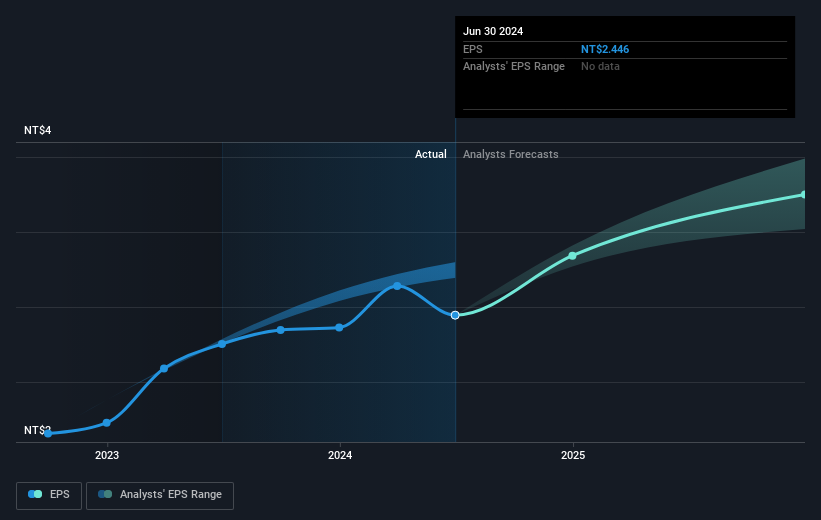- Taiwan
- /
- Aerospace & Defense
- /
- TWSE:2634
The 85% return delivered to Aerospace Industrial Development's (TWSE:2634) shareholders actually lagged YoY earnings growth

By buying an index fund, investors can approximate the average market return. But if you choose individual stocks with prowess, you can make superior returns. For example, Aerospace Industrial Development Corporation (TWSE:2634) shareholders have seen the share price rise 75% over three years, well in excess of the market return (28%, not including dividends).
Since the stock has added NT$1.7b to its market cap in the past week alone, let's see if underlying performance has been driving long-term returns.
Check out our latest analysis for Aerospace Industrial Development
While the efficient markets hypothesis continues to be taught by some, it has been proven that markets are over-reactive dynamic systems, and investors are not always rational. One imperfect but simple way to consider how the market perception of a company has shifted is to compare the change in the earnings per share (EPS) with the share price movement.
Aerospace Industrial Development was able to grow its EPS at 113% per year over three years, sending the share price higher. The average annual share price increase of 20% is actually lower than the EPS growth. So one could reasonably conclude that the market has cooled on the stock.
You can see how EPS has changed over time in the image below (click on the chart to see the exact values).

It is of course excellent to see how Aerospace Industrial Development has grown profits over the years, but the future is more important for shareholders. Take a more thorough look at Aerospace Industrial Development's financial health with this free report on its balance sheet.
What About Dividends?
It is important to consider the total shareholder return, as well as the share price return, for any given stock. Whereas the share price return only reflects the change in the share price, the TSR includes the value of dividends (assuming they were reinvested) and the benefit of any discounted capital raising or spin-off. So for companies that pay a generous dividend, the TSR is often a lot higher than the share price return. As it happens, Aerospace Industrial Development's TSR for the last 3 years was 85%, which exceeds the share price return mentioned earlier. The dividends paid by the company have thusly boosted the total shareholder return.
A Different Perspective
While the broader market gained around 38% in the last year, Aerospace Industrial Development shareholders lost 7.2% (even including dividends). Even the share prices of good stocks drop sometimes, but we want to see improvements in the fundamental metrics of a business, before getting too interested. Longer term investors wouldn't be so upset, since they would have made 11%, each year, over five years. It could be that the recent sell-off is an opportunity, so it may be worth checking the fundamental data for signs of a long term growth trend. While it is well worth considering the different impacts that market conditions can have on the share price, there are other factors that are even more important. Case in point: We've spotted 2 warning signs for Aerospace Industrial Development you should be aware of.
For those who like to find winning investments this free list of undervalued companies with recent insider purchasing, could be just the ticket.
Please note, the market returns quoted in this article reflect the market weighted average returns of stocks that currently trade on Taiwanese exchanges.
New: Manage All Your Stock Portfolios in One Place
We've created the ultimate portfolio companion for stock investors, and it's free.
• Connect an unlimited number of Portfolios and see your total in one currency
• Be alerted to new Warning Signs or Risks via email or mobile
• Track the Fair Value of your stocks
Have feedback on this article? Concerned about the content? Get in touch with us directly. Alternatively, email editorial-team (at) simplywallst.com.
This article by Simply Wall St is general in nature. We provide commentary based on historical data and analyst forecasts only using an unbiased methodology and our articles are not intended to be financial advice. It does not constitute a recommendation to buy or sell any stock, and does not take account of your objectives, or your financial situation. We aim to bring you long-term focused analysis driven by fundamental data. Note that our analysis may not factor in the latest price-sensitive company announcements or qualitative material. Simply Wall St has no position in any stocks mentioned.
About TWSE:2634
Aerospace Industrial Development
Engages in the development, manufacturing, integration, assembly, and testing and verification of aircraft systems and parts in Taiwan and internationally.
Excellent balance sheet and fair value.


